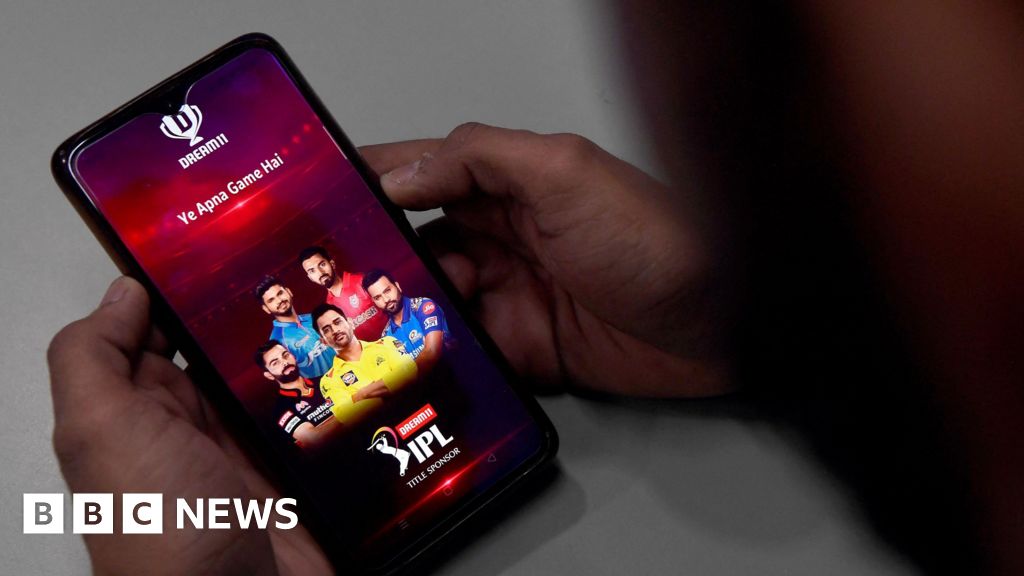Kartik Srinivas (name changed) still flinches at the mention of online betting. What began as a thrill to earn a quick buck spiraled into a five-year addiction that cost the 26-year-old his savings, peace of mind and nearly his future.
Between 2019 and 2024, Srinivas lost more than 1.5 million rupees ($17,000; £13,000). The money included three years of his earnings, as well as savings and loans from friends and family.
I tried everything - apps, local bookies, international platforms. I was hooked, he says. By 2024, he was neck-deep in losses.
Srinivas' story reflects the darker side of India's once booming Real Money Games (RMG) industry - where players use online platforms to bet cash on poker, fantasy sports and other games. Days ago, India passed a bill to outlaw these games, arguing they had become increasingly addictive and were leading to financial distress among people.
The new law makes offering or enabling such services punishable, with a jail term of up to three years and a fine of up to 10 million rupees. Promoting them carries penalties of two years and five million rupees, though users are treated as victims, not offenders.
The government has defended the move as a way to protect consumers from gambling. Federal IT Minister Ashwini Vaishnaw highlighted that online money games had harmed 450 million Indians, contributing to reported losses exceeding 200 billion rupees and rising cases of mental health issues, including depression.
However, many industry advocates are criticizing the ban as a knee-jerk reaction, claiming it will diminish a thriving industry and ultimately hurt the very people it aims to protect. Prior to the prohibition, around 400 RMG startups generated nearly $2.3 billion in tax revenues and sustained over 200,000 jobs. Dream11, one of the prominent players, even sponsored India's cricket team.
While the new ban is under federal law, many states already had similar restrictions, demonstrating a growing trend toward increased scrutiny of online gaming. Some experts believe that instead of an outright ban, a more nuanced approach focusing on regulation rather than prohibition might yield better consumer outcomes.
The 2023 tax implementation of 28% on online gaming bets had previously signaled a tightening approach towards the sector.
Critics, such as Mumbai-based gaming lawyer Jay Sayta, argue the new legislation was rushed through without appropriate consultation. The abrupt nature of the ban caught many unprepared, and there are fears of driving legitimate users towards illegal gambling sites, which lack regulation and consumer protections.
The sentiments reflect that simply outlawing the platforms might not address the root causes of gambling issues in India. Many individuals resort to underground betting networks or offshore gambling applications that circumvent local laws.
In light of this, voices in the industry are calling for a reconsideration of the ban, noting that a balanced oversight model could protect consumers while allowing the innovation and employment opportunities that the gaming sector supports.
Between 2019 and 2024, Srinivas lost more than 1.5 million rupees ($17,000; £13,000). The money included three years of his earnings, as well as savings and loans from friends and family.
I tried everything - apps, local bookies, international platforms. I was hooked, he says. By 2024, he was neck-deep in losses.
Srinivas' story reflects the darker side of India's once booming Real Money Games (RMG) industry - where players use online platforms to bet cash on poker, fantasy sports and other games. Days ago, India passed a bill to outlaw these games, arguing they had become increasingly addictive and were leading to financial distress among people.
The new law makes offering or enabling such services punishable, with a jail term of up to three years and a fine of up to 10 million rupees. Promoting them carries penalties of two years and five million rupees, though users are treated as victims, not offenders.
The government has defended the move as a way to protect consumers from gambling. Federal IT Minister Ashwini Vaishnaw highlighted that online money games had harmed 450 million Indians, contributing to reported losses exceeding 200 billion rupees and rising cases of mental health issues, including depression.
However, many industry advocates are criticizing the ban as a knee-jerk reaction, claiming it will diminish a thriving industry and ultimately hurt the very people it aims to protect. Prior to the prohibition, around 400 RMG startups generated nearly $2.3 billion in tax revenues and sustained over 200,000 jobs. Dream11, one of the prominent players, even sponsored India's cricket team.
While the new ban is under federal law, many states already had similar restrictions, demonstrating a growing trend toward increased scrutiny of online gaming. Some experts believe that instead of an outright ban, a more nuanced approach focusing on regulation rather than prohibition might yield better consumer outcomes.
The 2023 tax implementation of 28% on online gaming bets had previously signaled a tightening approach towards the sector.
Critics, such as Mumbai-based gaming lawyer Jay Sayta, argue the new legislation was rushed through without appropriate consultation. The abrupt nature of the ban caught many unprepared, and there are fears of driving legitimate users towards illegal gambling sites, which lack regulation and consumer protections.
The sentiments reflect that simply outlawing the platforms might not address the root causes of gambling issues in India. Many individuals resort to underground betting networks or offshore gambling applications that circumvent local laws.
In light of this, voices in the industry are calling for a reconsideration of the ban, noting that a balanced oversight model could protect consumers while allowing the innovation and employment opportunities that the gaming sector supports.


















